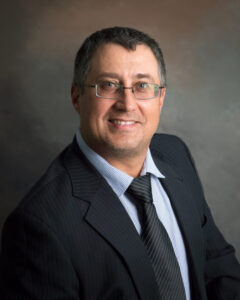Texas Biomed expands expertise in computational biology and mathematical modeling with new faculty addition

Texas Biomed’s newest faculty member, Professor Vitaly Ganusov, PhD, combines math and immunology to investigate two of the world’s leading killers: malaria and tuberculosis (TB). Recruited from The University of Tennessee, Knoxville, Dr. Ganusov is excited to join an institute dedicated to eradicating the threat of infectious diseases.
“I really like the spirit of the Institute,” Dr. Ganusov says. “There is this drive to solve world problems, find cures and understand how things work. I want to be part of that. Let’s solve these problems. Let’s help humanity in the best way possible.”
In his Theoretical Immunology Lab at Texas Biomed, Dr. Ganusov will use mathematical models and other computational biology tools to understand biological processes of infection and immunity, and to identify potential diagnostics and treatments.
“Dr. Ganusov is a critical hire to further bolster our computational biology expertise at Texas Biomed,” says Executive Vice President for Research Joanne Turner, PhD. “Computational biology is very powerful – it helps us make discoveries so much faster than with experiments alone, especially by rapidly revealing connections between key processes.”
Dr. Ganusov relishes bringing the logic of math and physics to the help explain the complexity of biological systems. Rather than only being able to describe what researchers observe, he wants to be able to predict what will happen using well-crafted mathematical models.
Having such precise tools could potentially help predict if a medicine will work or fail under different conditions. Biological systems are so complex that it is challenging to create models that are simple enough to work and still be accurate. This is the space where Dr. Ganusov thrives.
“The ultimate goal of any science is to become not just descriptive, but more quantitative, more predictive,” he says.
A physical approach to immunology
Along with his computational expertise, Dr. Ganusov brings his research programs in TB and malaria. He is in good company at Texas Biomed, which is home to a large contingent of TB and malaria investigators.
Specifically, he currently studies how Mycobacteria tuberculosis, the bacteria causing TB, disseminate from the lungs to other parts of the body, such as the lymph nodes, spleen, liver and bone marrow – which are the typical manifestations of extrapulmonary TB.
“How exactly do the bacteria go outside of the lungs? What are the pathways and cells involved? How can dissemination be prevented?” he says. “It’s hard to diagnose disseminated TB in humans, so we’re looking for biological or genetic markers to tell if somebody may have disseminated TB.”
Similarly, he analyzes how malaria parasites physically move from the initial site of infection in the skin to blood vessels and then to the liver, and seeks ways to interrupt the process. As part of the research, he uses microscopy to observe how T cells respond to infected cells in mice in real time.
“We ask the question: are the T cells running towards the infection or just walk around and bump into it? And the answer so far is: they walk around,” he says.
Findings like these can help scientists define the limits on the number and quality of T cells a successful malaria vaccine will need to induce.
The power of teachers
Becoming a professor – especially one focused on immunology – was a series of accidents, Dr. Ganusov says.
Growing up in Norilsk, a small town north of the Arctic Circle in the former Soviet Union that is now Russia, Dr. Ganusov never considered going to college. He anticipated following his parents’ footsteps in trade work and becoming a lathe machine worker.
In school, he was drawn to physics and math. He participated in an advanced learn-by-mail mathematics and physics programs from Moscow Physics-Mathematics Institute (MFTI) and was invited to apply to a physics-focused boarding school in southern Siberia for his senior year. The school was 1,000 miles from home. Classes were taught by recent university graduates who were so enthusiastic that they inspired Dr. Ganusov to consider attending college.
“I thought, ‘Oh my gosh, I really liked this. I like how they talk about physics,’” he recalls. “And they challenged us with questions, some that maybe didn’t have answers but were in the spirit of questioning established truths in the book. It changed me somehow. Just being in that environment was really, really cool.”
From Siberia to Texas
He studied physics and biophysics at Krasnoyarsk State University (now Siberian Federal University) in Russia. During his graduate program, he received a presidential scholarship to study abroad in the United States – a scholarship he doubted would ever be awarded to a student like him in Siberia.
“I thought only students going to universities in Moscow or St. Petersburg would get it,” he says.
He landed in an immunology lab at Emory University. He says that once he learned English and was able to understand the papers his principal investigator was giving to him, he was hooked on immunology.
“It’s about me,” he says. “Studying the biophysics of bacteria is interesting, but it’s about them. With immunology, I do something that I find interesting, but I can also learn about myself, my immune system, how my body works.”
He has been in immunology ever since, earning his PhD from Emory University and the equivalent from the Institute of Biophysics in Russia. He completed postdoctoral research at Emory, Utrecht University in the Netherlands and Los Alamos National Laboratory, before joining The University of Tennessee in 2010.
While he will miss certain aspects of Tennessee, leaving a tenured position was worth it to be surrounded by other immunologists dedicated to biomedical research. He is eager to collaborate with scientists at Texas Biomed and share how computational approaches can help get the most insights out of experiments.
“Not every question in biology is ready for math,” he says. “But if there are good data and interesting questions, I’m in.”